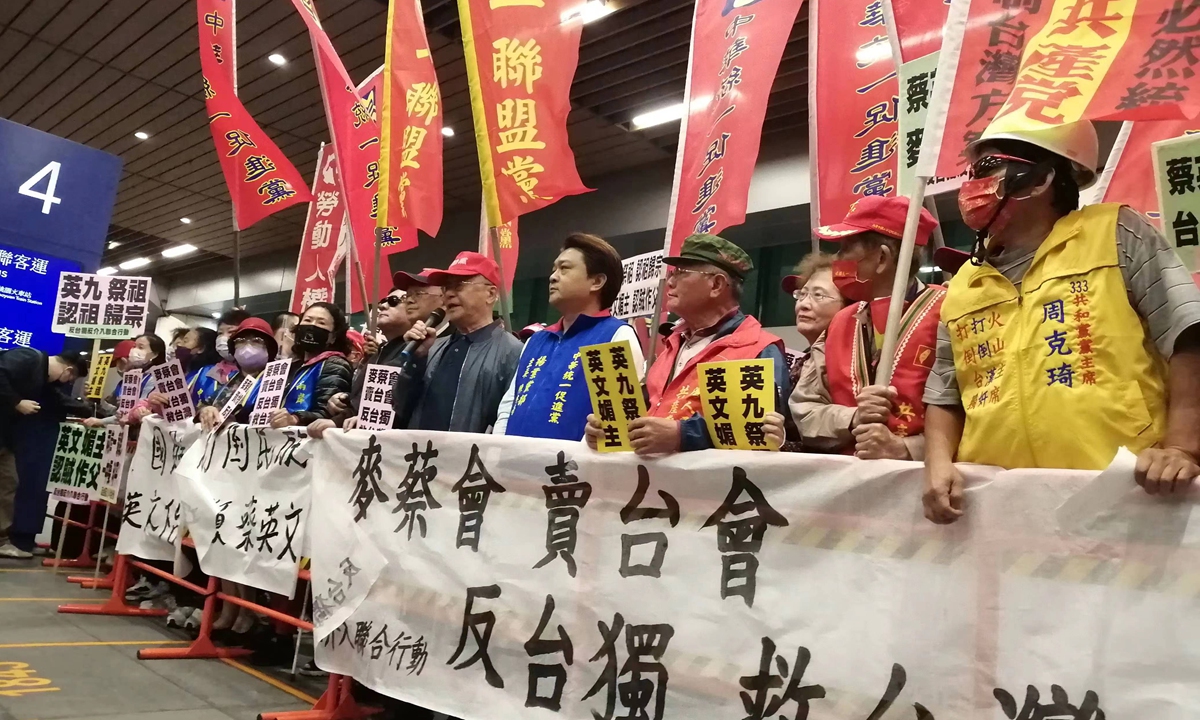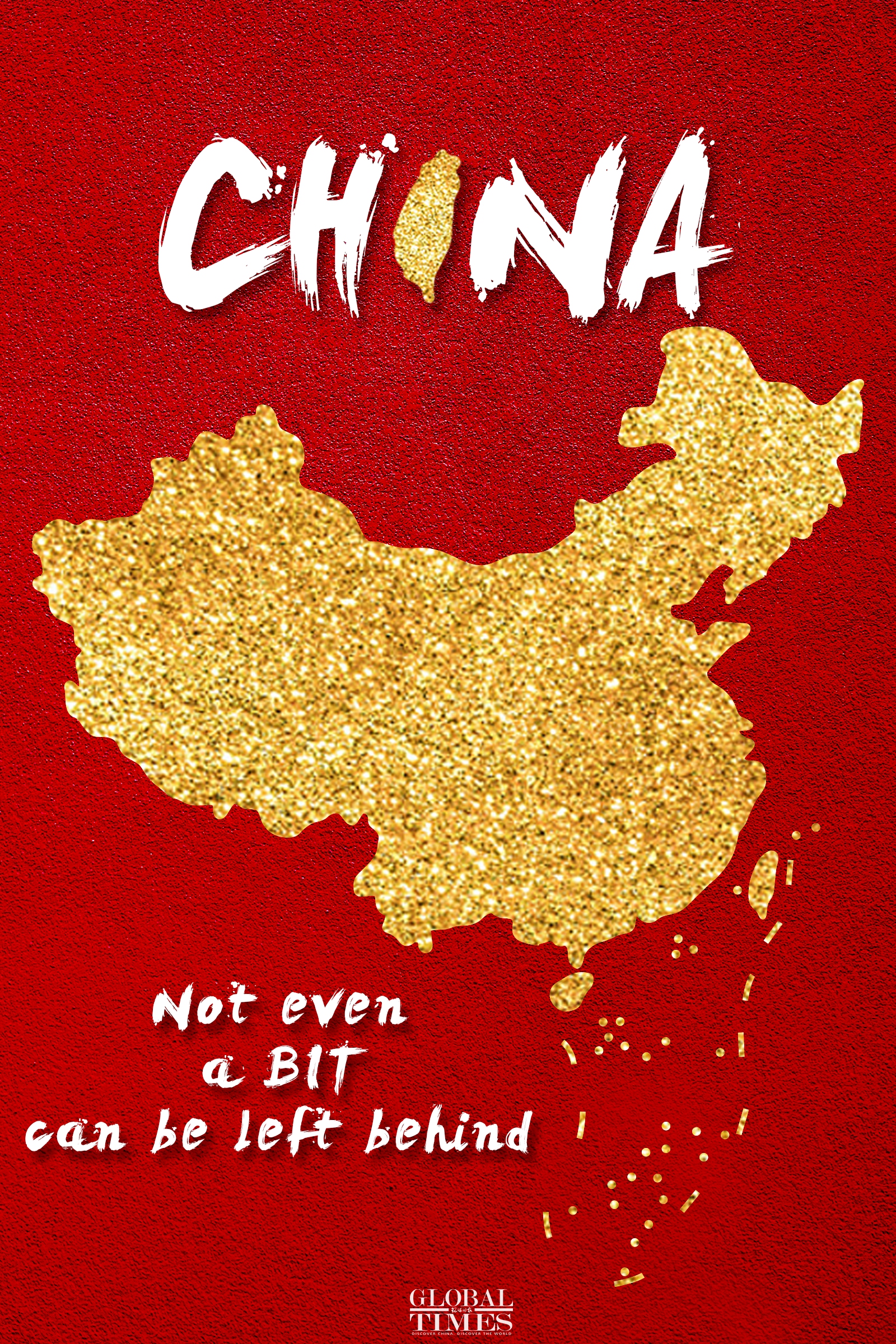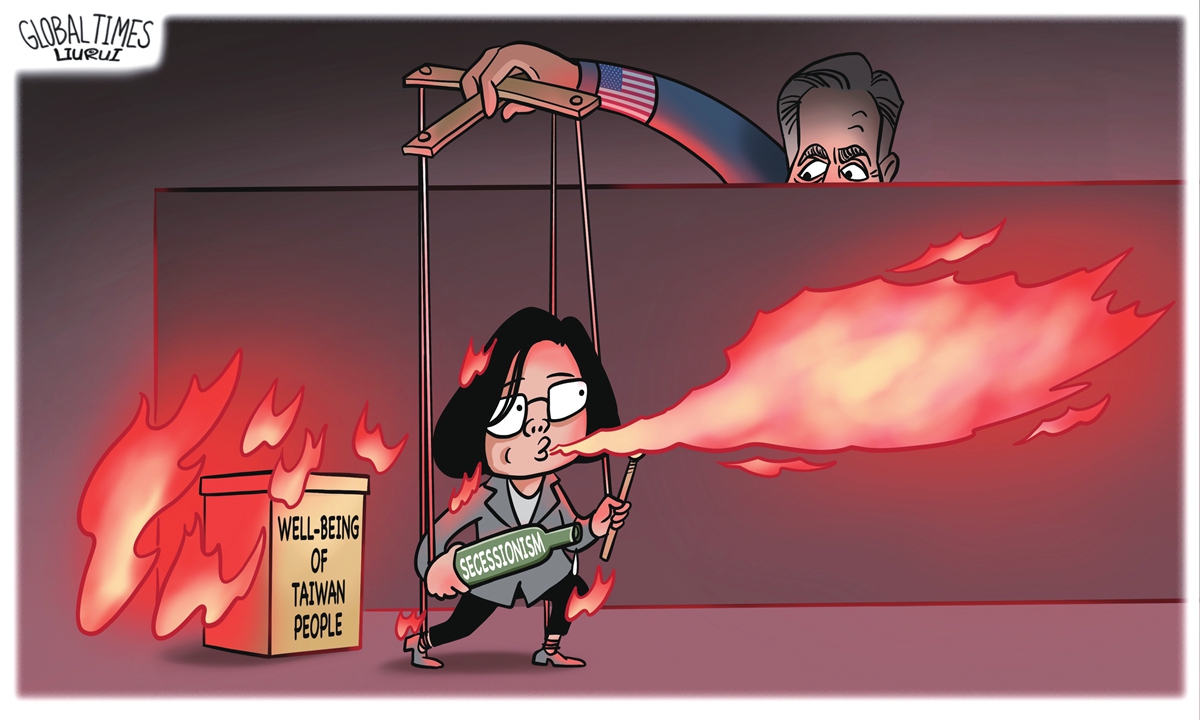
Civil groups and political parties in Taiwan island stage a rally at Taoyuan Airport on April 7, protesting against Taiwan regional leader Tsai Ing-wen for colluding with US politicians to seek "Taiwan independence" and escalating cross-Straits tensions. Photo: Courtesy of Taiwan's Labor Party
Beijing on Friday imposed a package of sanctions on a diehard "Taiwan independence" separatist, two Taiwan organizations, as well as US Hudson Institute and the Ronald Reagan Presidential Library and four US individuals, as countermeasures, signaling a resolute response to the latest meeting between Taiwan regional leader Tsai Ing-wen and the US House Speaker Kevin McCarthy in California.
Chinese experts believed that the latest sanctions signaled that China would counter any organization or individual that supported Taiwan secession under the banner of "democracy and freedom," which would have a deterrent effect on US-Taiwan collusion and warn the US government not to indulge in so-called "unofficial collusion" between the ultra-conservative forces and "Taiwan independence" secessionists for the sake of US national interests.
China's top office on the Taiwan affairs - the Taiwan Work Office of the Communist Party of China (CPC) Central Committee - announced on Friday the imposing of sanctions on "Taiwan independence" separatist Hsiao Bi-khim, who colluded with the US and provoked confrontation between the two sides of the Taiwan Straits.
The Taiwan Affairs Office of the State Council also announced sanctions of two organizations - the Prospect Foundation and the Council of Asian Liberals and Democrats - which, under the instigation of the DPP authorities, used the pretext of "democracy," "freedom" and "cooperation," and under the disguise of "academic exchanges" and "seminars," to advocate for "Taiwan independence" in the international arena. They have gone all out to ingratiate themselves with anti-China forces, creating incidents that promoted "one China, one Taiwan" or "two Chinas" that violate the one-China principle, the office's spokesperson said.
Heads of these two organizations, in addition to Hsiao and her family members, are prohibited from entering the mainland, Hong Kong and Macao, and organizations and individuals in the mainland are forbidden from cooperating with them.
The Chinese Foreign Ministry announced on Friday sanctions on the Hudson Institute and the Ronald Reagan Presidential Library as well as four individuals in charge of the organizations.
In disregard of China's repeated representations and resolute opposition, the US deliberately greenlighted the so-called "transit" of Tsai, through the US for political activities, the Foreign Ministry said.
The two organizations provided a platform and convenience for her separatist activities seeking "Taiwan independence," seriously violating the one-China principle and the provisions of the three China-US joint communiques, and seriously infringing upon China's sovereignty and territorial integrity, it said.
Under China's countermeasures, universities, institutions and other organizations and individuals in China are restricted from conducting transactions, exchanges and cooperation as well as other activities with the two sanctioned organizations.
The four individuals including Sarah May Stern, chair of Hudson Institute, John Walters, president of the institute, John Heubusch, executive director of the Ronald Reagan Presidential Foundation & Institute, and Joanne Drake, chief administrative officer of the institute are also placed on the sanction list.
Their movable and immovable assets and all other assets in China will be frozen and organizations and individuals in China will be prohibited from conducting transactions, cooperation and other activities with them. The individuals are prohibited from entering China and barred from obtaining Chinese visa, the ministry said.

China, not even a bit can be left behind Graphic: Deng Zijun/GT
New trend
The latest
sanction makes Hsiao, a confidant of Tsai who was appointed as the island's representative to the US in 2020 when the Trump-led GOP administration aligned closer to DPP secessionists, the first diehard secessionist to be named and sanctioned twice by the mainland. The Chinese mainland sanctioned Hsiao in 2022 for pushing US arms sales to Taiwan island and advancing former House Speaker Nancy Pelosi's visit to Taiwan.
Hsiao colluded with the US and intentionally provoked the confrontation between the two sides of the Taiwan Straits and damaged the peace and stability in the region, which fully exposed her ill-intentioned motives of seeking "Taiwan independence," a spokesperson from the Taiwan Work Office of the CPC Central Committee said on Friday.
Wang Yingjin, director of the Center for Cross-Straits Relations Studies at the Renmin University of China, told the Global Times on Friday that the latest sanctions showed the mainland's resolute opposition to Taiwan secession, and the attitude of not condoning pawns who shuttle between the US and Taiwan fermenting collusion.
While the mainland sanctions have targeted more individual politicians in the past, analysts said the latest sanctions against Taiwan organizations represent a new trend.
According to public information, the Prospect Foundation was established in 1997 and once described itself as a "private academic think tank for the study of international political and economic situations". However, since the DPP came to power in 2016, it has become a platform for advocating "Taiwan independence" and a tool for collusion with external forces under the guise of "academic exchange." The foundation was involved in former US Secretary of State Mike Pompeo's visit to Taiwan in 2022.
Another sanctioned institute, the Council of Asian Liberals and Democrats, is also a long-standing platform for the DPP to spread its voice of secession and smearing the mainland.
Their approach to obstruct China's reunification is by portraying China's efforts in resolving the Taiwan question as a matter of values in which "authoritarianism challenges democracy," Wang noted.
Sanctions signal a new trend that the Chinese mainland will not tolerate any people, as well as organizations that hinder China's national reunification, an internal affair, under the guise of "democracy," Wang said.
Chinese Foreign Ministry Spokesperson Mao Ning on Friday said that the Taiwan question is not about democracy but about China's sovereignty and territory integrity… Some countries peddle a "democracy vs authoritarianism" narrative, connive at and support "Taiwan independence" separatist forces in the name of democracy, which is actually using the island to contain China.
"We will never leave room for 'Taiwan independence' separatist activities in any form," Taiwan Affairs Office spokesperson Zhu Fenglian said on Friday, noting that "complete reunification of our country must be realized, and it can, without doubt, be realized."

Illustration: Liu Rui/GT
Warning to USDuring meeting with McCarthy at the Ronald Reagan Presidential Library, Tsai said that "democracy is under threat," and "the urgency of keeping the beacon of freedom shining cannot be understated," according to a CNN report.
Hudson Institute's President John P. Walter awarded Tsai "Global Leadership Award" in New York on March 30, praising Tsai has led "a vibrant democracy with great courage and clear-eyed determination to resist tyranny."
The Hudson Institute is a conservative US think tank that is often host to extreme anti-China politicians such as Pompeo and his principal China policy and planning advisor Miles Yu. Analysts also see the Ronald Reagan Presidential Library as a platform that has produced many anti-China statements that undermine the one-China principle and challenge China's national sovereignty.
"I think sanctions are very targeted, and will be powerful deterrence to those who support 'Taiwan independence' secessionist forces in the US, Li Haidong, a professor at the China Foreign Affairs University, told the Global Times on Friday.
If individuals or institutions blindly advocate "Taiwan independence," it will certainly hinder their normal communication with relevant Chinese counterparts, said Li.
It is also an effort to show the international community that the one-China principle and the relevant resolutions of the UN Charter and the provisions in the three China-US joint communiqués cannot be weakened or undermined, Li remarked.
As for the
countermeasures against Ronald Reagan Presidential Library and Hudson Institute, experts said the Chinese mainland's attitude is restrained and calm.
According to Li, China takes into account that the general situation relevant to China-US relations should be cooperative and stable, but also won't allow those "Taiwan independence" secessionists and some US conservative forces that support them to undermine bilateral relations.
Sanctions are also a reminder to the US government that it should take China's position seriously and not let the so-called "unofficial" ties with the Taiwan authorities go unchecked, or even disguise the strengthening of relations with the "Taiwan independence" secessionists, Li said.
The White House should take China's countermeasures as a warning and avoid allowing ultra-conservative forces that provide a stage for "Taiwan independence" secessionists to undermine America's own long-term and fundamental interests, Li noted.






